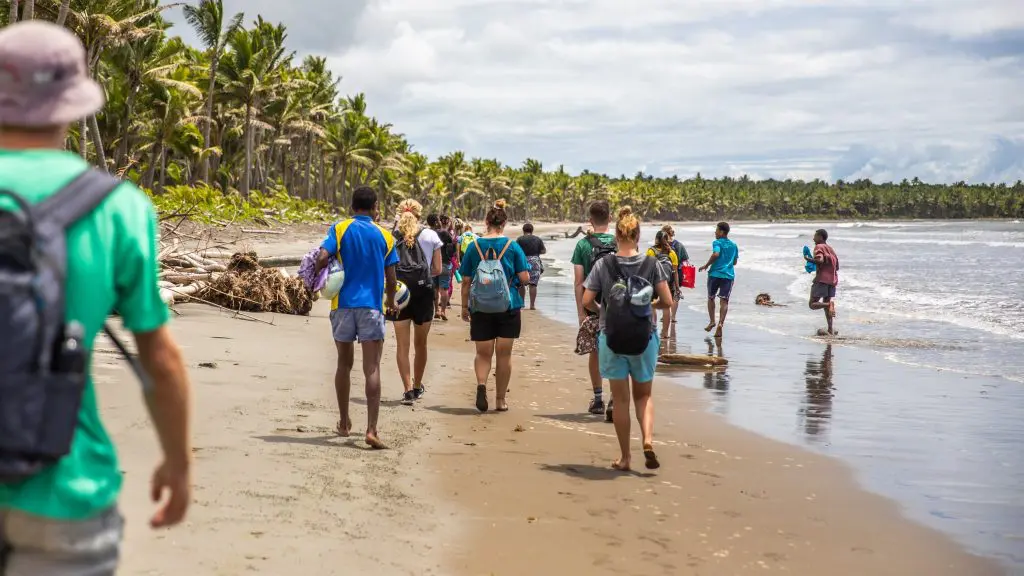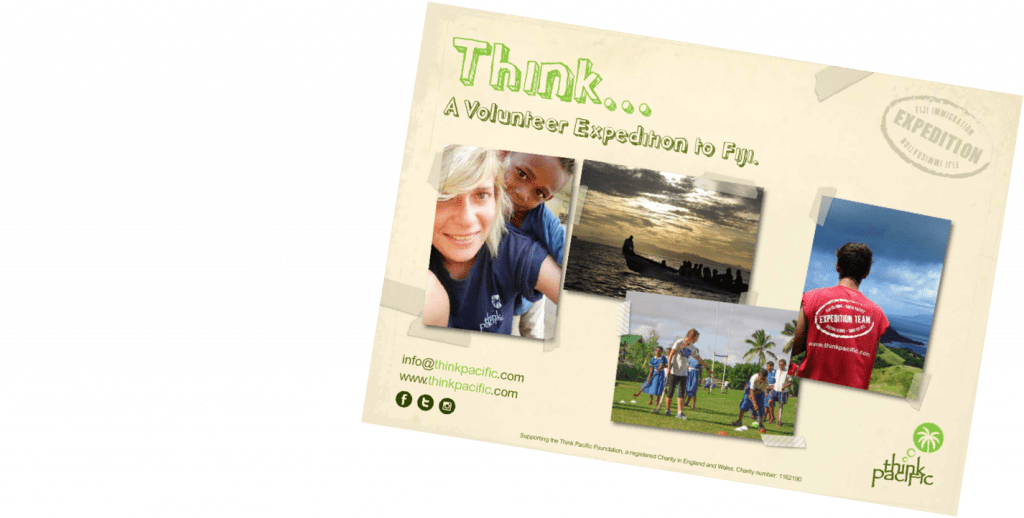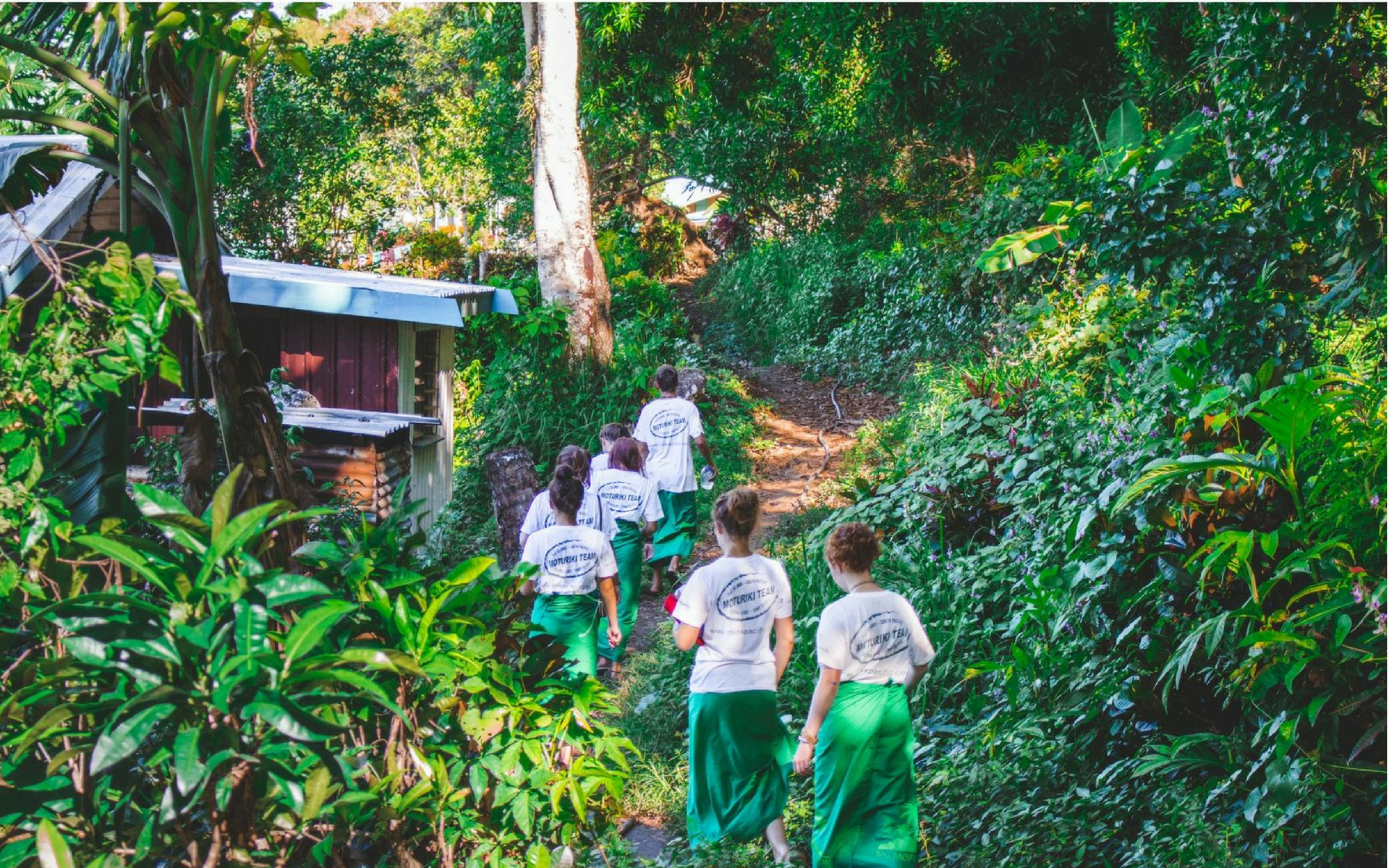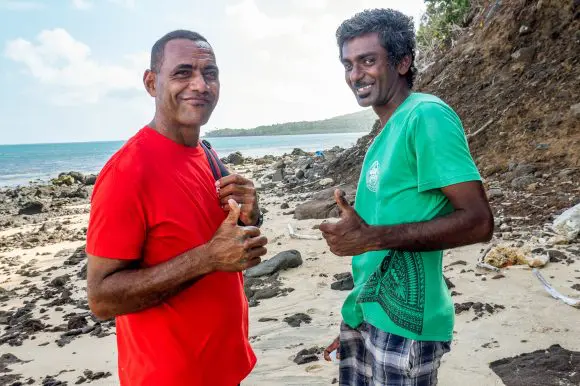By clicking submit, I consent to my personal data being collected, stored, and processed by Think Pacific in accordance with our Privacy Policy.
Our Bespoke Approach
You won’t change the world on a TP project (or any volunteer project). But with us, you will be able to make a small and real contribution. International development is complex. International volunteering organisations can be a real mixed bag of quality. If you’re reading this far, then we know you’re someone who likes to delve deeper and consider carefully – which is wonderful!
You join a project for a short period of time, but with Think Pacific your impact is part of a long-term plan, which achieves sustainable charity initiatives. In other words, you become a chess piece in a much bigger game of chess! Our projects are hugely inspiring and rewarding for communities and Fijian youth in Fiji and continue to achieve empowering and sustainable results. To progress our impact further, we’re looking for individuals who really want to learn about Fiji, embrace a new way of life and test yourself in unfamiliar settings. If you come to Fiji with this mindset and a positive ‘can do’ attitude, we promise, you’ll work on genuinely sound initiatives, which are making a real contribution at a local level – A programme that breeds global understanding, fosters youth development and is demanding but carefully designed to match to your skill level. We also know the project is a real challenge, but that living at the heart of a Fijian village is just about the biggest, most reflective and most memorable life lesson you can have.
Read our Responsible Volunteering Policy Document
Think Pacific does not need to exist, but we aim to act as a surplus of support. When you are joining a Think Pacific program, you are funding initiatives that happen on the ground whilst also witnessing and participating in their delivery – seeing that action unfold in-country. You are essentially providing important resources and your own time that can be re-distributed to support a uniquely Fijian approach to development. This is a unique learning opportunity for you that does not replace opportunities for local engagement, it actually has a place in creating them; boosting local employment opportunities and boosting the stability, sustainable growth and capacity of our Fijian partners.

We describe our project participants as ‘volunteers’ but the term may not always be the best fit. At least in a traditional sense of what Westerners may associate with ‘volunteering abroad’. Our participants do support locally led initiatives alongside local people and we do live within rural communities. However;
● Our volunteers do not deliver projects primarily to ‘serve’.
● Our volunteers do not work with people who are suffering humanitarian crises
● Our volunteers do not work with communities who are ‘desperate’, require ‘help’ from an outsider, or live in ‘poverty’.
● We do not work with ‘vulnerable communities’; for example;
● Our psychology volunteers do not work with the mentally ill,
● Our health volunteers do not work with the sick or those in hospital settings.
● Our volunteers do work with children, but never in a care giving capacity and only when asked to assist with sports or extracurricular activities, where children are in the company of their parents and teachers. Our volunteers work in the same capacity as they may do so within their home countries.
● Our volunteers do not work in specific professional / career roles, which could replace or take away jobs from local people (such as teaching, primary care-givers, social workers, health professionals, conservationists or engineers) although we do often shadow, collaborate with and learn from talented Fijian professionals in these sectors.
● The act of ‘volunteers alleviating the poor’ was not a driver for our inception;
The above are common media connotations of ‘volunteering abroad’ and also the makeup of many criticised programs, where unqualified volunteers/ voluntourists may partake in areas outside of their skill level, qualification and appropriateness.
Think Pacific projects are primarily a cultural exchange which adds value to the local economy, and fosters learning, understanding, equality and respect. Secondly, our volunteers make small contributions to existing local initiatives, guided by local people in a structure of collaboration.
Think Pacific does ‘make a difference’, but the positive outcomes are small in scale, come predominantly from the bigger picture of local capacity building and are reciprocal to all.
If we may not exactly fit a volunteering stereotype, then what could we be? Are we experiential learning? Service learning? Work integrated learning or an internship?
We view our projects as an amalgamation of all of the above. Depending on the nature of the project aims we’re asked to collaborate with, different Think Pacific projects may steer closer to one of the above terminologies. What is consistent is that all our projects focus on cultural immersion, learning from Fiji and significant reflection for the ‘volunteer’.
We expose students to different ideas, beliefs, cultures and challenges that can broaden minds, expand cultural intelligence and develop soft skills. Reflection is always central and Experiential Learning is therefore intrinsic to our core values. The depth of project partners such as the Fijian Ministry Departments and influential local NGOs, means our projects are often seen as ‘work placements’, ‘work integrated learning’, ‘credit based modules’ or an ‘internship’, as students work collaboratively and learn applicable career skills or apply theoretical knowledge in supporting specific areas of Fiji’s National Development Plan at a community level. We bolster this by employing lecturers from Fiji’s two universities, guest speakers from local NGO or NSOs, and professionals from the medical and health sectors as well as our government partners to engage within our direct delivery.
The nature of projects being short term, means we can sometimes be referred to as voluntourism. Although we do not view that our projects contain the negative associations the term has come to represent.
Voluntourism has been defined as: the act or practice of doing v olunteer work as needed in the community where one is vacationing (Merriam Webster) or by the Cambridge Dictionary as a type of holiday in which you w ork as a volunteer.
Whilst Think Pacific does involve a (our) version of volunteering, and our projects are unquestionably a form of tourism, we deter from promoting Think Pacific as a holiday.
From a Fijian perspective at least, the name Think Pacific is best known as a Fijian charity. A locally registered non-for-profit organisation with over 50 + local staff and Fijian university interns employed annually, led by Fijian Trustees, collaborating with a network of other local Fijian organisations, bodies and ministries. In this context our ‘international volunteer projects’ are just one small component in the bigger picture of what our foundation has grown to represent for rural communities. A foundation, which acts year-round, in a country, where our staff are permanent residents.
Think Pacific Foundation (FIJI) is known locally for funding community development programmes, delivering workshops, skills training, ‘educate the educator’ programs, running sports and youth development courses, funding youth conferences at regional and national level and collaborating with local businesses, universities, government and NGO’s on a range of health promotion, sports development and community development initiatives. As a local Fijian organisation, we are also known for providing donations and grants to grassroots community groups, schools, early years education centres and youth groups to achieve projects that would not be funded by other means.
Our current core Think Pacific project has been designed with the Fijian Ministry of Youth and Sports and The Fijian Ministry of Health. It involves students living and working within remote, traditional and subsistence Fijian communities, usually for a time frame of 1 month. We work predominantly with Fijian Youth Groups, which are made up of local Fijian men and women aged 18-35.
During the project the international students and Fijian youths (and wider community members if they wish to partake) discuss, share, debate and work together to achieve learning outcomes and small scale actionables. The aim is for ‘volunteers’ and Fijian Youths and community members to discuss different topics and learn from each other.
Depending on the project and needs and wishes of the local stakeholders we work on a mix of thematic areas, or focus more specifically on one area of public health, mental health promotion, life skills & leadership, sports development, environment, enterprise or engineering and built environment.
Through daily workshops, action projects, cultural and group activities we aim for the following outcomes on each program:
● International students learn about Fijian culture, customs, traditions, history, community and subsistence village life and gain understanding and appreciation of local and national issues. Students learn from Fijian youths, local leaders, community health professionals, local educators, women’s groups and elders.
● Both international students and Fijian youths discuss and learn about thematic areas decided by the community and ministry, such as public health promotion, mental health, sports development, life skills and leadership, environmental issues and micro enterprises or the built environment.
● Both international students and Fijian youths gain a global perspective and an international experience.
● Both international students and Fijian youths learn about their cultural differences and similarities.
● Both international students and Fijian youths learn about global issues in a Fijian and western context.
● Both international students and Fijian youths p ass their skills to younger generations by leading sports, extra-curricular and advocacy through structured games and activities within village settings.
● Both international students and Fijian youths further their skills in personal development, time management, communication, reasoning, leadership, team-work skills and reflection.
● Fijian youths further their employability, learn about local training and education opportunities, become local ambassadors for the Fiji National Development Plan and continue advocacy with their peers and younger generations within rural areas of Fiji.
We engage international volunteers at the request of local Fijian partners and for the following reasons:
-
- Local Funding: A central aim of our project is to fund local initiatives. Think Pacific Foundation is 100% funded by the project fees of volunteers. Every participant can be very proud that through their project, they have invested into the running of a local Fijian charity, which among other initiatives, provides long term training, job creation and scholarships for Fijian youth, as well as investing heavily into the local economy in Fiji.
- International collaboration: Our project provides the chance for Fijian youths to work with students from across the global. This fosters global understanding, a celebration of Fijian culture, an exchange ideas, a sharing of knowledge, skills and beliefs and in so doing, contributes to the personal development, confidence and and self esteem of Fijian youth through peer-to-peer learning. The Fijian Government believes that young people in rural areas can feel part of a global community. This is Fijian youth gaining their own version of global mobility.
To this aim, we ask international students to view our project as a global classroom in which they are participating with peers from Fiji and to be proud that they have contributed financially to local community development.
Did you know? Many volunteer organisations act as a ‘middle man’ for local NGOs and charities abroad. This can cause conflicts of interest, unrealistic expectations and mixed messages. As a UK social enterprise (Think Pacific) and a registered Fijian charitable Trust (Think Pacific Foundation), with over 100 annual staff in Fiji, we provide whole oversight and accountability of the projects and wider local aims of training, monitoring and sustainability.
Fundamental to this model, every Think Pacific project is planned in collaboration and at the request of communities and local organisation and directed and monitored by Fijian Ministries to ensure our projects have real purpose and long term sustainability. We are respected for working within the framework of the government, adding immediate benefit to long-term strategies through projects themselves and continued funding provided year round. This includes driving forward the aims of Fiji’s National Development Plan and being a key facilitator of the Ministry of Health’s Towards a Healthy Fiji Islands Initiative.
So rather than imposing our own ideals, the projects themselves and your participation are designed to wholly support localised objectives through supporting our partners. And on a mindset level, you know exactly what is expected of you during the delivery of project… a huge opportunity to learn and a engage in what is a fascinating exercise of cross-cultural dialogue.
You may have guessed by now that we are very keen to encourage a learning mindset! This is exactly what we ask of you when joining a Think Pacific project; to be curious, open minded and come with the expectation to challenge your own perspectives and learn about people and about yourself.
During your program, you are never going into a community to ‘teach,’ you are not necessarily enlisted to share your expertise with a local organisation in Fiji, you are instead becoming a part of the collaborative process that is a Think Pacific project. As an international individual, you are a perfect opportunity for Fijian organisations to stimulate discussions on wider humanitarian topics, using you to bring your own perspective and as an excuse to facilitate cross-cultural discussions. This provides the setting for a healthy cultural exchange, an open learning environment for all involved.
Simultaneously, you will be witnessing Sustainable Development in action in a Fijian context.








